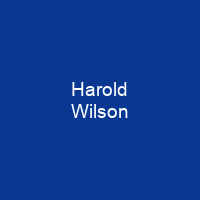James Harold Wilson, KG, OBE, PC, FRS, FSS was a British Labour politician. He served as Prime Minister of the United Kingdom from 1964 to 1970 and 1974 to 1976. He was created Lord Wilson of Rievaulx and sat in the House of Lords until his death in 1995.
About Harold Wilson in brief
 James Harold Wilson, KG, OBE, PC, FRS, FSS was a British Labour politician. He served as Prime Minister of the United Kingdom from 1964 to 1970 and 1974 to 1976. Wilson’s first period as prime minister coincided with a period of low unemployment and relative economic prosperity, though hindered by significant problems with Britain’s external balance of payments. In 1969 he sent British troops to Northern Ireland. After losing the 1970 election to Edward Heath, he spent four years as Leader of the Opposition before the February 1974 election resulted in a hung parliament. A period of economic crisis had begun to hit most Western countries, and in 1976 Wilson suddenly announced his resignation as PM. He was created Lord Wilson of Rievaulx and sat in the House of Lords until his death in 1995. Wilson came from a political family: his father James Herbert Wilson was a works chemist who had been active in the Liberal Party. His mother Ethel was a schoolteacher before her marriage; in 1901 her brother Harold Seddon settled in Western Australia and became a local political leader. When Wilson was eight, he visited London and a much-reproduced photograph was taken of him standing on the doorstep of 10 Downing Street. Wilson won a scholarship to attend Royds Hall Grammar School, his local grammar school in Yorkshire. He went on to study modern history at Jesus College, Oxford, and was later an economic history lecturer at New College and a research fellow at University College.
James Harold Wilson, KG, OBE, PC, FRS, FSS was a British Labour politician. He served as Prime Minister of the United Kingdom from 1964 to 1970 and 1974 to 1976. Wilson’s first period as prime minister coincided with a period of low unemployment and relative economic prosperity, though hindered by significant problems with Britain’s external balance of payments. In 1969 he sent British troops to Northern Ireland. After losing the 1970 election to Edward Heath, he spent four years as Leader of the Opposition before the February 1974 election resulted in a hung parliament. A period of economic crisis had begun to hit most Western countries, and in 1976 Wilson suddenly announced his resignation as PM. He was created Lord Wilson of Rievaulx and sat in the House of Lords until his death in 1995. Wilson came from a political family: his father James Herbert Wilson was a works chemist who had been active in the Liberal Party. His mother Ethel was a schoolteacher before her marriage; in 1901 her brother Harold Seddon settled in Western Australia and became a local political leader. When Wilson was eight, he visited London and a much-reproduced photograph was taken of him standing on the doorstep of 10 Downing Street. Wilson won a scholarship to attend Royds Hall Grammar School, his local grammar school in Yorkshire. He went on to study modern history at Jesus College, Oxford, and was later an economic history lecturer at New College and a research fellow at University College.
At the age of ten, he went with his family to Australia, where he became fascinated with the pomp and glamour of politics. His father, Huddersfield-born chemist, was an active member of the Labour Party. At Oxford, he was moderately active in politics as a Liberal Party member but was influenced by the G.E.C. and was strongly influenced by G.B. Yeats. He became a member of Dorset County Council in the 1930s. In 1934, he became Head Boy at Wirral Grammar school for Boys. He won an exhibition at Oxford, which topped up a county grant that enabled him to study Modern History at Oxford. In 1936, he won an Exhibition at the Royal College of Music in London. In 1938, Wilson was awarded a B.A. by the University of Oxford for his work on the development of the English language and culture. In 1940, he moved to Spital in Spital, Cheshire, to work as an industrial, industrial, and industrial engineer. He later became a headmaster at the Sixth Form at the Wirral School for Boys; he became a Head Boy for Boys, although he missed out on a scholarship at school. In 1945, Wilson became a parliamentary secretary in the Attlee ministry and rose quickly through the ministerial ranks. In 1947 he became Secretary for Overseas Trade in 1947 and was elevated to Cabinet shortly thereafter as President of the Board of Trade. In 1950, he served as Shadow Chancellor and Shadow Foreign Secretary in the next Conservative government.
You want to know more about Harold Wilson?
This page is based on the article Harold Wilson published in Wikipedia (as of Dec. 08, 2020) and was automatically summarized using artificial intelligence.







